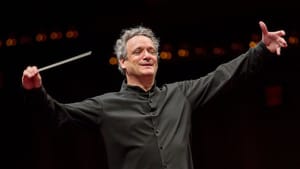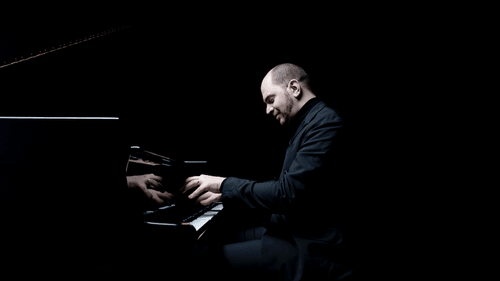Stay in the Loop
BSR publishes on a weekly schedule, with an email newsletter every Wednesday and Thursday morning. There’s no paywall, and subscribing is always free.
Revel in Ravel
Philadelphia Orchestra presents 'French Tales,' with guest conductor Louis Langrée

Three little words are guaranteed to strike fear in my concertgoing heart: “all-French program.” When the Philadelphia Orchestra announced French Tales, an evening of music by Saint-Saëns, Franck, Dukas, and Ravel, I steeled myself for a boring, melodic time. But one element caught my eye and gave me hope: the return of the excellent, underappreciated conductor Louis Langrée.
I first discovered Langrée — music director of the Cincinnati Symphony Orchestra and Lincoln Center’s Mostly Mozart Festival — a decade ago, when he conducted a spectacular performance of Gluck’s Iphigenie en Tauride at the Metropolitan Opera. Yet his presence at the Met has been sporadic and strangely unheralded.
No Mickey Mouse rendition
Thankfully, Philly hasn’t dragged its feet in re-engaging Langrée, who made a superb subscription debut conducting Beethoven and Brahms two years ago. (You can read Linda Holt’s BSR review here). A native of Mulhouse, France, he displays idiomatic flair in French music, while invigorating the compositions in a way that makes them interesting to borderline Francophobes like yours truly.
Take, for example, his treatment of Saint-Saëns’s tried-and-true “Danse Macabre” — appearing on a subscription program, surprisingly, for the first time since 1959. Coming a week before Halloween, its inclusion could signal the potential for maximum schlock.
But Langrée and associate concertmaster Juliette Kang, playing the spooky violin solos, kept the piece crackling, ratcheting up to a chilling dance of death. The orchestra’s reading also drew out the underlying folk aspect of the music.
Similarly well known and equally well handled was Dukas’s “The Sorcerer’s Apprentice” — best known for its Stokowski-conducted performance in Disney’s Fantasia. Aside from perhaps Rachmaninoff’s Symphonic Dances, no other piece of music is as closely associated with this orchestra.
For most audience members, I imagine, it’s hard to picture this piece without seeing Mickey Mouse, but Langrée treated it seriously, drawing richly colored playing in the composition’s distinctive writing for bassoon. The jarring staccato and pizzicato playing in the strings made a nice contrast to the traditionally blended, sweeping Philadelphia sound.

Chills and thrills
The concert looked beyond the familiar with Franck’s “The Accursed Huntsman,” returning to the orchestra’s repertoire after nearly 40 years. Chronicling a nobleman whose decision to forage on the Sabbath leads him on a horse ride to hell, it made for an exhilarating, suspenseful choice.
The opening soundscape of French horns (representing a hunting call), bells (drawing worshippers to church), and luxuriously textured cellos created a serene, bucolic atmosphere that quickly gave way to foreboding dread. As the huntsman defiantly thumbed his nose at God, Langrée engaged the percussion in a full-court press, which seemed to call down the powers of heaven and earth. Although this bombastic approach occasionally swamped the other sections of the orchestra, its effect was thrilling.
Equally thrilling was Ravel’s Piano Concerto in G Major, dispatched with boundless energy by virtuosic Kirill Gerstein. The Russian pianist — looking like a sexy Bond villain in a black turtleneck and shiny jacket — plucked out the jazzy sonorities and highlighted the influence of ragtime, blues, and Tin Pan Alley style on the Parisian composer. I also keenly felt the Gallic influence in the playing of flutist Jeffrey Khaner and piccolo player Erica Peel.
Ravel’s sweeping "Suite No. 2" from Daphnis et Chloé concluded the evening on a high. Langrée drew cinematic swells from the strings, richly expressive playing from the percussion section, and an otherworldly contribution from Elizabeth Hainen on the harp. The players built beautifully to a bacchanalian release.
Maybe I do like French music after all. Or maybe, in the hands of a master like Louis Langrée, everything sounds good.
To read Linda Holt's review, click here.
What, When, Where
French Tales. Louis Langrée, conductor; Kirill Gerstein, piano; Juliette Kang, violin; Elizabeth Hainen, harp. Selections by Camille Saint-Saëns, César Franck, Paul Dukas, and Maurice Ravel. The Philadelphia Orchestra. October 24-26, 2018, at the Kimmel Center’s Verizon Hall, 300 S. Broad Street, Philadelphia. (215) 893-1999 or philorch.org.
Sign up for our newsletter
All of the week's new articles, all in one place. Sign up for the free weekly BSR newsletters, and don't miss a conversation.

 Cameron Kelsall
Cameron Kelsall